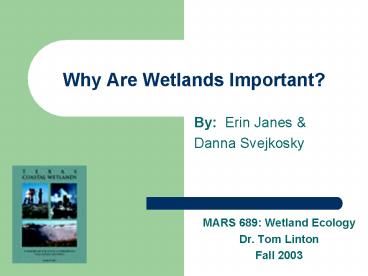Why Are Wetlands Important
1 / 20
Title: Why Are Wetlands Important
1
Why Are Wetlands Important?
- By Erin Janes
- Danna Svejkosky
- MARS 689 Wetland Ecology
- Dr. Tom Linton
- Fall 2003
2
The Value of Wetlands
- Functions and Values
3
Air Quality
- Stability of global levels of1
- Available nitrogen
- Atmospheric sulfur
- Carbon dioxide
- Methane
Photo by Mike P. Murphree
4
Water QualityChemical and Physical Properties
- Hydrologic conditions can be modified by
- Nutrient availability
- Degree of substrate anoxia
- Soil salinity
- Sediment properties
- pH
5
Water QualityBiotic Properties
- Vegetation can control water conditions through
- Peat building
- Sediment trapping
- Nutrient retention
- Water shading
- Transpiration
6
Storm Abatement
- Wetlands act as buffer of storm surge and wave
energy - Sustain minimal damage
- Shelter inland property
Regional wetlands are integral parts of larger
landscapesdrainage basins, estuaries.1
7
Erosion Control
- Shoreline stabilization
- Aerial parts of marsh plants dissipate wave
energy - Both offshore and longshore transport of sediment
are reduced - Dense stands can create a depositional
environment - Plants form dense root-rhizome mats, adding
stability to the shore sediment - Particularly important during winter storms when
aerial stems provide only limited resistance to
the impact of waves
8
Erosion Control
- Planting marsh grass is a better alternative
than - Bulkheads
- Seawalls
- Rip rap
Gulf Intercoastal Waterway
Photo Courtesy of USACE, Galveston District
9
Shoreline Erosion Problems?Think Green
- From the Virginia Institute of Marine Science
(VIMS)
10
Flood Protection
- Intercept storm runoff and store storm waters1
- Reduces flood damage caused by peak flows
- Seasonal variations
- Case Study
- USACE study led to Corps decision to purchase
3,400 hectares of wetlands in the Charles River
Basin (Massachusetts) to effectively prevent
flood damage, rather than build expensive
flood-control structures to protect the city of
Boston at the savings of 17 million per year.1
11
Fish Habitat
- Ecosystem Diversity and Stability
- Spawning Habitat
- Nursery Habitat
- Food Production
12
Fish Habitat- Ecosystem Diversity and Stability
- Wetlands play a significant role in maintaining a
high level of biological diversity. - Wetlands provide a variety of habitats which
increases - species diversity
- species richness
- species numbers
13
Fish Habitat- Spawning and Nursery Habitat
- Fish need specific environmental conditions for
adequate spawning areas and juvenile habitat. - Spawning fish need
- Good water quality
- Protection from predators
- An adequate place to deposit eggs
- Juvenile fish need
- Food
- Good water quality
- Protection from predators
14
Fish Habitat- Food Production
- Nutrients, shallow water, and plants provide the
necessary elements for the production of algae,
zooplankton, and invertebrates, which are
utilized by other fish.
15
For the Birds
- Birds use wetlands for
- Breeding
- Nesting
- Rearing young
- A source of drinking water
- Feeding
- Resting
- Shelter
- Social interactions
16
Fish and Wildlife Habitat
- The U.S. Fish and Wildlife Service estimate that
43 of all threatened and endangered species rely
directly or indirectly on wetlands for their
survival.
17
Recreation and Economy
- Hunting, fishing, hiking, boating, photography,
and bird watching opportunities are abundant in
our wetlands. - 98 million U.S. adults spend a total of 59.5
billion annually on recreational activities
within wetlands.
18
Commercial Fisheries and Economy
- Coastal wetlands support 60 - 90 of the
commercial fisheries in the United States.
- Big Business In Texas2
- Provides jobs for 30,000 residents
- 400 million annually
- Shrimp
- Oysters
- Blue Crab
- Black Drum
- Southern Flounder
19
Other Values
- Historical
- Archeological finds suggesting the use of
wetlands for a variety of subsistence and
commercial uses - Scientific/Educational
- Scientific research to further our understanding
of the ecology, geology, chemistry, etc. of the
Earth - Source of community education
- Cultural
- Representation of a community heritage
20
Other Values, cont.
- Aesthetics
- High quality of life enjoyed by the general
public and property owners































